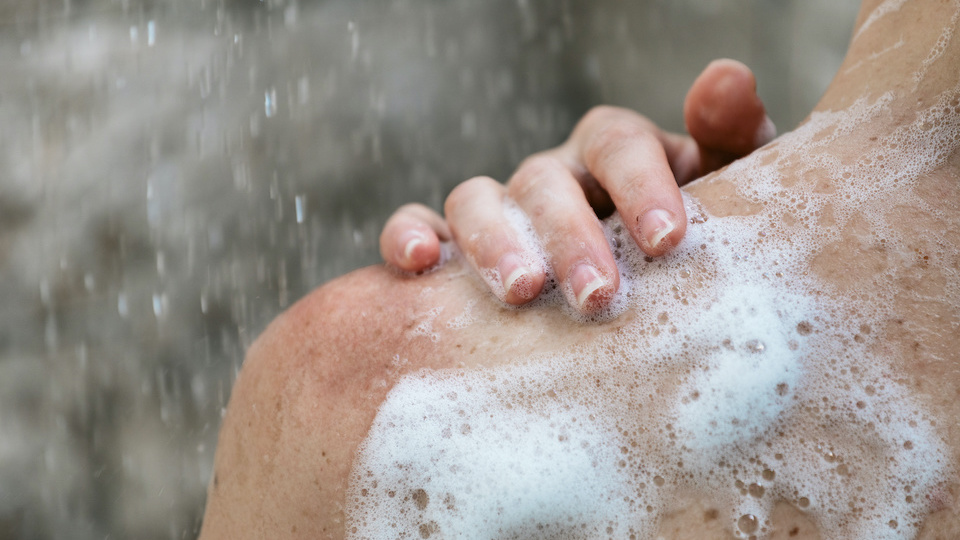Every morning you do it on autopilot: stumble into the shower, turn on the tap, and enjoy the soothing flow of water that helps wake you up and feel refreshed for the start of your day. According to YouGov, an international research data and analytics group, most of us (66% of adults in the U.S.) find a reason to shower daily. But have you ever wondered whether such frequent showering is really necessary? Or if it could even be harmful?
In fact, some say that showering every day could be worse than not bathing at all. It turns out, the daily shower is more about habit and societal norms than health. We are worried that we may repel others with our appearance or odor, we’ve been told it’s unhygienic to skip a day of showering, or perhaps our culture or religion dictates frequent bathing.
If you think that taking a shower everyday is what you must do to stay healthy and hygienic, then give it a second thought, as recent research reveals that over-cleaning can damage the human microbiome, thereby affecting the immune system, digestion and even heart health.
Curious to learn more? Here are a few concerning things that showering does to your body.
Over-showering damages your immune system
According to researchers from the Genetic Science Centre at the University of Utah, over-cleaning can damage the human microbiome – a collection of bacteria, viruses, and other microbes that live in and on your body.
Antibacterial soaps can kill off normal bacteria. This upsets the balance of microorganisms on the skin and encourages the emergence of less friendly organisms that are more resistant to antibiotics.
Our immune systems need a certain amount of stimulation by normal microorganisms, dirt, and other environmental exposures to create protective antibodies. This is one reason why some pediatricians and dermatologists recommend against daily baths for kids. Frequent baths or showers throughout a lifetime may reduce the ability of the immune system to do its job.
Microorganisms are essential to our health: among many other functions, they help us absorb nutrients, digest food, fight inflammation, and defend against cancer. Disrupting the microbial ecosystem can result in an increased risk of disease, and your immune system, digestion, and even heart health could suffer.
Over-showering dries out your skin
Normal, healthy skin maintains a layer of oil and a balance of “good” bacteria and other microorganisms that actually serve as part of the skin’s immune barrier. Washing and scrubbing removes these, especially if the water is hot. As a result, the skin may become dry, irritated, or itchy. Dry, cracked skin may allow bacteria and allergens to breach the barrier that skin is supposed to provide, allowing skin infections and allergic reactions to occur. Skin conditions like eczema and acne could be caused or exacerbated by hot showers and the use of soaps and personal care products.
Over-showering makes you smellier and oilier
Constantly washing off the oil and bacteria causes the system to “overreact,” and create too much oil and bacteria to compensate. Showering less frequently can help encourage a long-term balance and actually result in less body odor and oil production.
Showering ruins your hair and nails
Showering can rid your hair and nails of the natural oils they need to stay moisturized.
It might seem like you need to do it, especially if you have oily hair. But as it turns out, your hair might be oily because you shower every day. When you wash your hair too much, your scalp goes into oil production overload, producing more to make up for the amount you are washing away with every shower.
Shower water could contain toxins
Some suggest that the tap water we clean ourselves with may contain salts, heavy metals, chlorine, fluoride, pesticides, and other chemicals. Research conducted on the health effects of chlorinated drinking water has demonstrated a variety of toxicity issues. For example, chlorine vapors are associated with higher risk of asthma, and may damage the mucosal lining of the respiratory tract. In addition, free radicals in chlorinated water have been linked to liver malfunction, weakening of the immune system, and pre-arteriosclerotic changes in arteries.
Showering is costly to you, and the planet
According to a residential water use study, the average bath uses 132 to 189 liters of water, whereas a 10-minute shower with a low-flow showerhead uses 95 liters. There are costs associated with producing the hot water and purifying the water after it has been used. There is also the pollution caused by personal care products, which may contain toxic chemicals like sulfates and parabens. Skipping a daily hot shower could save on your water bill and save the environment too.
Cold showers are a different story
In an interesting twist, a group of Dutch researchers found that people who took a cold shower for 30 to 90 seconds every day for one month called in sick 29% less than the control group, and 54% less if they also engaged in regular physical exercise. The exact mechanism of a cold shower on the immune system isn’t well understood, but researchers say the cool temperature activates the metabolism and improves the body’s thermoregulation. This shows that a simple, brief cold-water rinse could be considered in a different category than the usual hot, soapy shower that most of us engage in daily.
Overall, it seems that there is no universal formula for showering and that different choices may benefit different people, depending on the situation. You could consider sticking with a daily shower if you live in the tropics where it is very humid, if you work out daily, or if you work in a chemical factory, hygiene facility, or medical facility. On the other hand, it’s probably best to avoid showering daily if you live in a dry climate, in a place with harsh winters, have sensitive or dry skin, or tend to suffer from eczema. Babies and older people, whose skin is thinner and more sensitive, should also avoid daily bathing, especially with soaps or cleansers.
Perhaps the best practice is to take a brief, water-only rinse, focusing on areas like the armpits and groin and leaving the rest of the skin to “self-cleanse.” Try using lukewarm, not hot water, keep your shower short, and avoid applying soap or shampoo to the body daily. Surprisingly, by bathing less, you could be cleaner and healthier in the long run.
-The Well Daily Team







